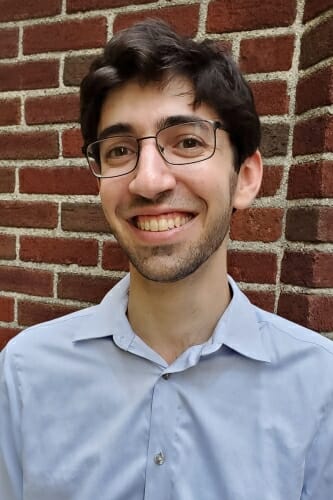New Faculty Focus: Brandon Bloch
Brandon Bloch: Assistant Professor of History
Hometown: Sharon, Massachusetts

Brandon Bloch
Educational/professional background: I went to college at the University of Pennsylvania and completed my PhD at Harvard in 2018. I then taught at Harvard for two years as College Fellow in Modern European History.
How did you get into your field of research? I bounced between subjects when I started college. I eventually chose to major in history because I thought (and still think) that it offers the most compelling way to explain the structures and institutions that shape our everyday lives, often without our noticing. History also forces us to confront moral ambiguity and question our assumptions about unfamiliar societies and cultures; these challenges more than anything drew me to the study of modern Germany. I became captivated by the problem of constructing narratives that could encompass the horrors of Nazism and the Holocaust alongside the complex ways in which Germans have shaped the modern world, from the rise of the nation-state to the invention of the research university to the forging of a unified Europe. Although my initial interests were in German-Jewish history, I chose to focus my research on devout Lutherans who were raised in the ultranationalist climate of German Protestantism before World War II, but tried to reimagine their churches as organs of democracy after 1945. This was another great challenge. I had to learn an entirely new culture and get into the minds of people whose life experiences—and frameworks for interpreting those experiences—diverged dramatically from my own. But this period was not so long ago. The questions my subjects grappled with, about the meaning of democracy and the role of religion in a secularizing society, are still with us. There is simultaneously a familiarity and strangeness that continues to fascinate me.
What attracted you to UW–Madison: The university has a storied legacy in German history and European intellectual history (our humanities building is named for George L. Mosse, a Jewish refugee of Nazi Germany and towering historian of modern Europe), along with outstanding programs in European studies and human rights. There are many faculty members and students who share my interests in these areas and with whom I hope to collaborate in the coming years. I’m also looking forward to using the German history collections at Memorial Library and the Wisconsin Historical Society, once these are able to reopen.
What was your first visit to campus like? Bitterly cold (it was mid-February), but the academic environment was invigorating—there is a real excitement in the history department about debating ideas and getting to the bottom of historical problems. I was thrilled to be invited back to teach here.
What’s one thing you hope students who take a class with you will come away with? History is about learning to see the world differently, not simply memorizing names and dates. I hope my students will come to understand themselves as historical subjects: inhabiting a world created by others before them, but which they too have the capacity to change.
Do you share your expertise and experiences with the public through social media? I am on Twitter (@BrandonBloch5), and my goal is to become more active this year. I recently published an essay in Boston Review and hope to do more writing for public venues as well.
Do you feel your work relates in any way to the Wisconsin Idea? Absolutely, I think it is crucial to make historical knowledge relevant for addressing contemporary problems. My own work foregrounds the idea of human rights, and how people have used human rights claims to confront some of the great injustices of recent history—but also how fragile these rights are in the absence of both institutional protections and broad acceptance within society. I hope my students will recognize both the necessity and fragility of rights as they take on the responsibilities of democratic and global citizens.
What’s something interesting about your area of expertise you can share that will make us sound smarter at parties? In nighttime photographs of Berlin from the International Space Station, the city’s Cold War partition is still visible. West Berlin uses environmentally friendly fluorescent streetlights that give off a white glow, while East Berlin uses older, sodium-vapor lamps that glow orange. It’s a striking reminder of how thirty years after the end of the Cold War, legacies of that division continue to impact life in the city—and in Germany and Europe more broadly.
Hobbies/other interests: Piano, though sadly these days mostly as a listener. I was trained on European classical composers, but have recently have gotten into listening to some of the great twentieth-century jazz artists, and that is what I want to work on when I get around to buying a keyboard or the music building reopens. My experiences as a musician definitely shape my approach to writing and teaching. Historical writing requires a lot of practice, but also creativity, voice, form, and expression.




